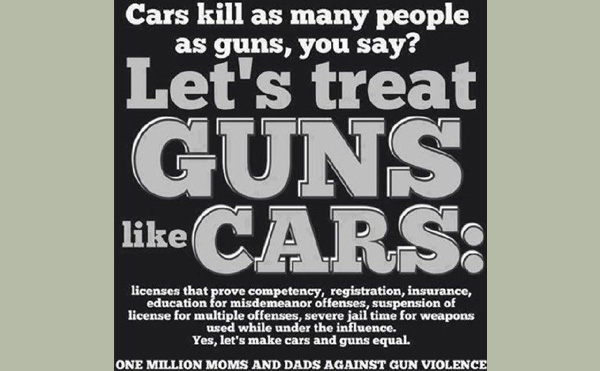It is not a new idea. It is idea that has even been spoken about this summer when Dr. Claire McCarthy proposed the idea again in the Huffington Post on June 2, 2015. The problem is that every time that idea is proposed gun enthusiasts and 2nd Amendment supporters says that the right to bear arms is different from the “privilege” of driving. Those opponents of gun safety are right in some ways but in a larger sense they are very wrong. While the right to bear arms is expressly written in the constitution and the right to drive a car is not, both rights are granted by the Constitution and both rights are able to be limited or restricted in order to protect public safety.
Many, if not all Americans, know that the Second Amendment to the Constitution says “A well-regulated militia, being necessary to the security of a free state, the right of the people to keep and bear arms, shall not be infringed.” For centuries, those who supported stricter regulations on the ownership and use of guns have looked to the first phrase “a well-regulated militia . . .” as grounds to support their advocacy of gun control. Gun control activists said that guns were not a private right held by an individual but a state right to ensure that the state would have a militia to protect against threats to the state from foreign states and from the federal government. Therefore, in the opinion of gun control advocates, the “right” can be reasonably restricted in order to protect public safety.
In 2008, the Supreme Court ruled in D.C. v. Heller that the 2nd Amendment did contain a private right and that the prefatory phrase “a well-regulated militia . . .” did not limit or expand the private individual right. According to the Supreme Court in Heller, a person has an individual and “fundamental” right to own a gun for whatever purpose s/he decides to own it. This decision was narrow in its scope in that in only invalidated one law in D.C. Moreover, the Court stated unequivocally in the decision that regulations on gun use and ownership will continue and that those regulations can still be constitutional if they do not violate the fundamental right to keep and bear arms.
A fundamental right has a specific meaning when discussing constitutional interpretation. When the Supreme Court describes a right as a fundamental right, they are saying that the right has great importance to the functioning of our constitutional democracy. The Court has held that these rights can only be restricted if there is a compelling government purpose, the governmental action is narrowly tailored and the government uses the least restrictive means possible to achieve its goals. Fundamental rights that the Court has recognized include the right to vote, the right to marriage and the right to interstate travel.
Second Amendment supporters have taken the Court’s decision in Heller and in McDonald v. Chicago to mean that almost any restriction on gun ownership or usage is a violation of their fundamental right. But those advocates do not recognize that fundamental rights can and must be restricted in order to protect the safety of the public. If that were not the case, then how can we accept and justify how the right to travel has been restricted and diminished by federal, state and local regulations governing car ownership and usage.
The right to travel, as mentioned above, is a fundamental right. That right was ruled by the Supreme Court to be fundamental well over a century before the Court even considered the right to bear arms. In 1868, the Court ruled in Crandall v. Nevada that a state cannot tax individuals for leaving the state because it restricted the fundamental right to interstate travel. This right has been recognized time and again by the Supreme Court as one of the most vital and fundamental rights that exists in our republic. Yet, despite the impact on the ability to travel for millions of the citizens of this country, no court has ever overturned automobile restrictions because they violated that person’s fundamental right to travel.
It does not require one to be a legal expert to see how regulations on the ownership of cars and licensing requirements to drive one restrict one’s ability to travel. If anyone can drive a car regardless of whether they are licensed to drive, then an unlicensed person’s ability to travel is greatly improved. Nor does the argument that driving is not a right, but a privilege hold any water when one sees that restricting a person’s driving has a dramatic impact on that person’s ability to travel. Just like for regulations on guns or marriage, regulations on cars have a great effect on a fundamental right and can only be justified if that restriction is the least restrictive means to achieve a compelling government purpose.
What is compelling enough to require government intervention is where we should begin and end this discussion. Gun rights advocates insistence that the right to keep and bear arms exists can be taken as a given, but they never consider nor are willing to discuss whether the regulations proposed have a compelling purpose. They say that the 2nd Amendment describes a right that cannot or should not be restricted. Well to those that say that, I say that the Constitution also contains a right to drive a car in order to allow freedom of movement and that right can and is restricted in order to protect public safety.
Therefore, we, as a society, should be able to do no more and no less to restrict gun ownership and use to protect public safety.
What say you?




